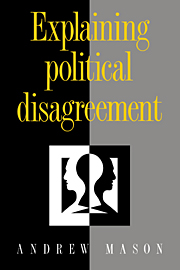Book contents
- Frontmatter
- Contents
- Preface
- Acknowledgements
- Introduction
- 1 Differences in values
- 2 The notion of an essentially contested concept
- 3 The miscommunication thesis
- 4 Integrating rational and non-rational explanations
- 5 A model for explaining some moral and political differences
- Concluding remarks
- Appendix
- Bibliography
- Index
4 - Integrating rational and non-rational explanations
Published online by Cambridge University Press: 18 December 2009
- Frontmatter
- Contents
- Preface
- Acknowledgements
- Introduction
- 1 Differences in values
- 2 The notion of an essentially contested concept
- 3 The miscommunication thesis
- 4 Integrating rational and non-rational explanations
- 5 A model for explaining some moral and political differences
- Concluding remarks
- Appendix
- Bibliography
- Index
Summary
The qualified version of the thesis that key political concepts are essentially contested which I have defended involves an element that is part of the contestability conception of how moral and political disagreement is to be explained, viz. the idea that the proper interpretation of key political concepts is a matter of reasonable dispute. But this version of the thesis also includes a commitment to moral cognitivism, so it contains an element of the imperfection conception as well. Does it therefore need to give a central role to a theory of error of the kind envisaged by the imperfection conception?
Defenders of the imperfection conception have supposed that if a moral and political belief is mistaken, its incorrectness can be demonstrated to the satisfaction of every reasonable person who is fully competent in applying the laws of logic, and has the time and patience to think through the issues. In consequence the theories of error they have developed have included a proof (or alleged proof) of the incorrectness of the views which are held to be mistaken. But the account I have constructed does not need to give a theory of error of this kind a central role because, if my defence of the notion of an essentially contested concept succeeds, many beliefs may be incorrect (and be known to be incorrect) even though there is no argument that can be given against them which must satisfy any reasonable person with the necessary logical skills.
- Type
- Chapter
- Information
- Explaining Political Disagreement , pp. 97 - 109Publisher: Cambridge University PressPrint publication year: 1993



